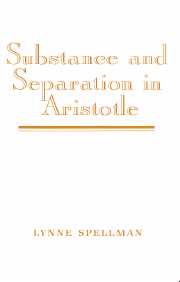II - Referential Opacity in Aristotle
Published online by Cambridge University Press: 04 December 2009
Summary
At the beginning of Metaphysics VII 6 Aristotle inquires whether each thing and its essence are the same or different, an inquiry that, he claims, is of use for the investigation of substance. In Chapter III I will argue that VII 6 does indeed tell us much about substance. What is of relevance in this chapter, however, is Aristotle's preparedness to raise such a question. What Aristotle says of the inquiry into the sameness of each thing and its essence is that each thing is thought to be not different from its substance and that the essence is said to be the substance of each thing (1031a15–19). It is easy enough to suppose that ‘is not different from’ means ‘is the same as’ and that ‘is the same as’ means ‘is identical with’. If this assumption is made, there would not seem much need for inquiry: If each thing is identical with its substance and its substance is identical with its essence, then obviously each thing is identical with its essence.
Nevertheless Aristotle does inquire about the relation between each thing and its essence, a way of proceeding that suggests that the sort of sameness that interests him may in fact not be identity.
- Type
- Chapter
- Information
- Substance and Separation in Aristotle , pp. 21 - 39Publisher: Cambridge University PressPrint publication year: 1995



